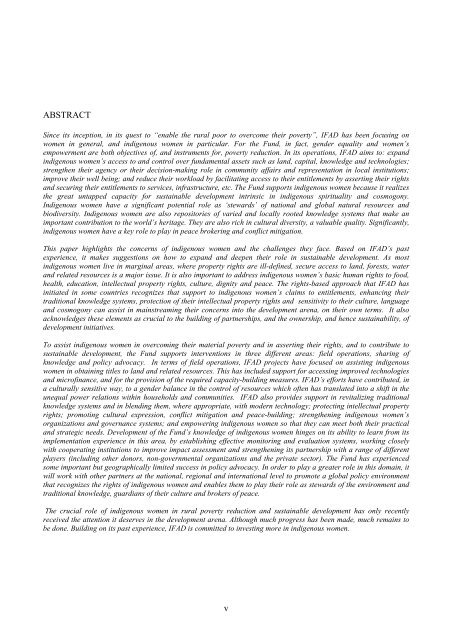Enhancing the Role of Indigenous Women in Sustainable ...
Enhancing the Role of Indigenous Women in Sustainable ...
Enhancing the Role of Indigenous Women in Sustainable ...
Create successful ePaper yourself
Turn your PDF publications into a flip-book with our unique Google optimized e-Paper software.
ABSTRACT<br />
S<strong>in</strong>ce its <strong>in</strong>ception, <strong>in</strong> its quest to “enable <strong>the</strong> rural poor to overcome <strong>the</strong>ir poverty”, IFAD has been focus<strong>in</strong>g on<br />
women <strong>in</strong> general, and <strong>in</strong>digenous women <strong>in</strong> particular. For <strong>the</strong> Fund, <strong>in</strong> fact, gender equality and women’s<br />
empowerment are both objectives <strong>of</strong>, and <strong>in</strong>struments for, poverty reduction. In its operations, IFAD aims to: expand<br />
<strong>in</strong>digenous women’s access to and control over fundamental assets such as land, capital, knowledge and technologies;<br />
streng<strong>the</strong>n <strong>the</strong>ir agency or <strong>the</strong>ir decision-mak<strong>in</strong>g role <strong>in</strong> community affairs and representation <strong>in</strong> local <strong>in</strong>stitutions;<br />
improve <strong>the</strong>ir well be<strong>in</strong>g; and reduce <strong>the</strong>ir workload by facilitat<strong>in</strong>g access to <strong>the</strong>ir entitlements by assert<strong>in</strong>g <strong>the</strong>ir rights<br />
and secur<strong>in</strong>g <strong>the</strong>ir entitlements to services, <strong>in</strong>frastructure, etc. The Fund supports <strong>in</strong>digenous women because it realizes<br />
<strong>the</strong> great untapped capacity for susta<strong>in</strong>able development <strong>in</strong>tr<strong>in</strong>sic <strong>in</strong> <strong>in</strong>digenous spirituality and cosmogony.<br />
<strong>Indigenous</strong> women have a significant potential role as ‘stewards’ <strong>of</strong> national and global natural resources and<br />
biodiversity. <strong>Indigenous</strong> women are also repositories <strong>of</strong> varied and locally rooted knowledge systems that make an<br />
important contribution to <strong>the</strong> world’s heritage. They are also rich <strong>in</strong> cultural diversity, a valuable quality. Significantly,<br />
<strong>in</strong>digenous women have a key role to play <strong>in</strong> peace broker<strong>in</strong>g and conflict mitigation.<br />
This paper highlights <strong>the</strong> concerns <strong>of</strong> <strong>in</strong>digenous women and <strong>the</strong> challenges <strong>the</strong>y face. Based on IFAD’s past<br />
experience, it makes suggestions on how to expand and deepen <strong>the</strong>ir role <strong>in</strong> susta<strong>in</strong>able development. As most<br />
<strong>in</strong>digenous women live <strong>in</strong> marg<strong>in</strong>al areas, where property rights are ill-def<strong>in</strong>ed, secure access to land, forests, water<br />
and related resources is a major issue. It is also important to address <strong>in</strong>digenous women’s basic human rights to food,<br />
health, education, <strong>in</strong>tellectual property rights, culture, dignity and peace. The rights-based approach that IFAD has<br />
<strong>in</strong>itiated <strong>in</strong> some countries recognizes that support to <strong>in</strong>digenous women’s claims to entitlements, enhanc<strong>in</strong>g <strong>the</strong>ir<br />
traditional knowledge systems, protection <strong>of</strong> <strong>the</strong>ir <strong>in</strong>tellectual property rights and sensitivity to <strong>the</strong>ir culture, language<br />
and cosmogony can assist <strong>in</strong> ma<strong>in</strong>stream<strong>in</strong>g <strong>the</strong>ir concerns <strong>in</strong>to <strong>the</strong> development arena, on <strong>the</strong>ir own terms. It also<br />
acknowledges <strong>the</strong>se elements as crucial to <strong>the</strong> build<strong>in</strong>g <strong>of</strong> partnerships, and <strong>the</strong> ownership, and hence susta<strong>in</strong>ability, <strong>of</strong><br />
development <strong>in</strong>itiatives.<br />
To assist <strong>in</strong>digenous women <strong>in</strong> overcom<strong>in</strong>g <strong>the</strong>ir material poverty and <strong>in</strong> assert<strong>in</strong>g <strong>the</strong>ir rights, and to contribute to<br />
susta<strong>in</strong>able development, <strong>the</strong> Fund supports <strong>in</strong>terventions <strong>in</strong> three different areas: field operations, shar<strong>in</strong>g <strong>of</strong><br />
knowledge and policy advocacy. In terms <strong>of</strong> field operations, IFAD projects have focused on assist<strong>in</strong>g <strong>in</strong>digenous<br />
women <strong>in</strong> obta<strong>in</strong><strong>in</strong>g titles to land and related resources. This has <strong>in</strong>cluded support for access<strong>in</strong>g improved technologies<br />
and micr<strong>of</strong><strong>in</strong>ance, and for <strong>the</strong> provision <strong>of</strong> <strong>the</strong> required capacity-build<strong>in</strong>g measures. IFAD’s efforts have contributed, <strong>in</strong><br />
a culturally sensitive way, to a gender balance <strong>in</strong> <strong>the</strong> control <strong>of</strong> resources which <strong>of</strong>ten has translated <strong>in</strong>to a shift <strong>in</strong> <strong>the</strong><br />
unequal power relations with<strong>in</strong> households and communities. IFAD also provides support <strong>in</strong> revitaliz<strong>in</strong>g traditional<br />
knowledge systems and <strong>in</strong> blend<strong>in</strong>g <strong>the</strong>m, where appropriate, with modern technology; protect<strong>in</strong>g <strong>in</strong>tellectual property<br />
rights; promot<strong>in</strong>g cultural expression, conflict mitigation and peace-build<strong>in</strong>g; streng<strong>the</strong>n<strong>in</strong>g <strong>in</strong>digenous women’s<br />
organizations and governance systems; and empower<strong>in</strong>g <strong>in</strong>digenous women so that <strong>the</strong>y can meet both <strong>the</strong>ir practical<br />
and strategic needs. Development <strong>of</strong> <strong>the</strong> Fund’s knowledge <strong>of</strong> <strong>in</strong>digenous women h<strong>in</strong>ges on its ability to learn from its<br />
implementation experience <strong>in</strong> this area, by establish<strong>in</strong>g effective monitor<strong>in</strong>g and evaluation systems, work<strong>in</strong>g closely<br />
with cooperat<strong>in</strong>g <strong>in</strong>stitutions to improve impact assessment and streng<strong>the</strong>n<strong>in</strong>g its partnership with a range <strong>of</strong> different<br />
players (<strong>in</strong>clud<strong>in</strong>g o<strong>the</strong>r donors, non-governmental organizations and <strong>the</strong> private sector). The Fund has experienced<br />
some important but geographically limited success <strong>in</strong> policy advocacy. In order to play a greater role <strong>in</strong> this doma<strong>in</strong>, it<br />
will work with o<strong>the</strong>r partners at <strong>the</strong> national, regional and <strong>in</strong>ternational level to promote a global policy environment<br />
that recognizes <strong>the</strong> rights <strong>of</strong> <strong>in</strong>digenous women and enables <strong>the</strong>m to play <strong>the</strong>ir role as stewards <strong>of</strong> <strong>the</strong> environment and<br />
traditional knowledge, guardians <strong>of</strong> <strong>the</strong>ir culture and brokers <strong>of</strong> peace.<br />
The crucial role <strong>of</strong> <strong>in</strong>digenous women <strong>in</strong> rural poverty reduction and susta<strong>in</strong>able development has only recently<br />
received <strong>the</strong> attention it deserves <strong>in</strong> <strong>the</strong> development arena. Although much progress has been made, much rema<strong>in</strong>s to<br />
be done. Build<strong>in</strong>g on its past experience, IFAD is committed to <strong>in</strong>vest<strong>in</strong>g more <strong>in</strong> <strong>in</strong>digenous women.<br />
v

















